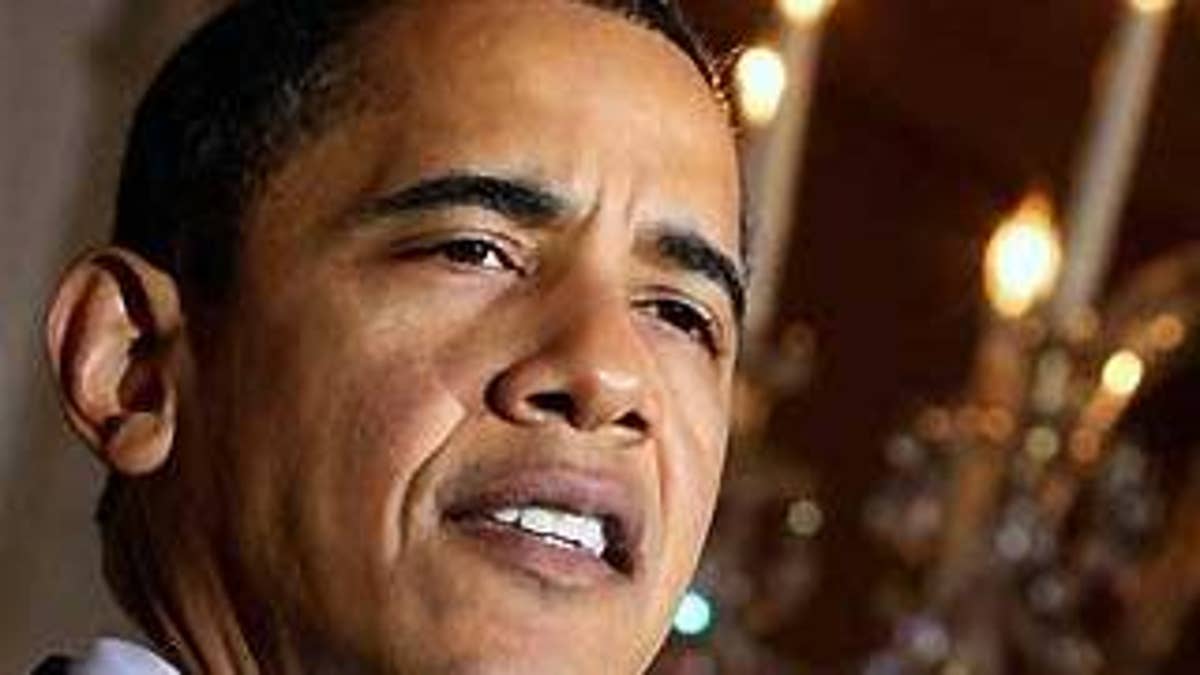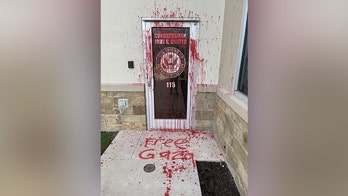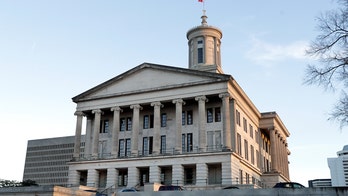
President Obama announced strict limits on pay to executives of bailed-out financial firms Wednesday, slamming Wall Street top dogs as "shameful" for accepting billions in bonuses last year.
The new restrictions will cap pay for government-aided Wall Street executives at $500,000.
Obama said he's instituting the new rules to put a stop to what he called a "culture of narrow self-interest and short-term gain" at the expense of taxpayers, and to take the "air out of golden parachutes."
"This is America. We don't disparage wealth," Obama said. "But what gets people upset, and rightfully so, is executives being rewarded for failure, especially when those rewards are being subsidized by U.S. taxpayers.
"For top executives to award themselves these kinds of compensation packages in the midst of this economic crisis isn't just bad taste. It's bad strategy. And I will not tolerate it as president," he said.
Treasury Secretary Timothy Geithner said the limits are designed to "strengthen the public trust" in the government's goal of creating jobs and freeing up credit. He said taxpayers currently share a sense that those not responsible for the financial crisis are bearing a greater burden than those who were responsible.
Last week, Obama called it "the height of irresponsibility" for financial employees to reap the billions in bonuses they got last year. A report from the New York state comptroller found employees of the New York financial world earned about $18.4 billion in bonuses last year.
The administration's most restrictive limits would apply only to struggling large firms that receive "exceptional" assistance in the future. Healthy banks that receive government infusions of capital would have more leeway.
Under the plan, firms that want to pay executives above the $500,000 threshold would have to compensate them with stock that could not be sold or liquidated until they pay back the government funds.
In addition, under the plan banks would face tougher restrictions on so-called golden parachutes and tougher transparency rules on expenses such as office renovations, entertainment and conferences.
Bailout recipients have drawn the ire of the public and lawmakers for sometimes planning lavish retreats and logging seemingly frivolous expenses. Most recently, Wells Fargo canceled a corporate retreat to Las Vegas' Wynn and Encore hotels after the trip became public.
The president and members of Congress have been weighing various proposals to restrict chief executives' compensation as one of the conditions of receiving help under the $700 billion financial bailout fund.
Banks and other financial institutions that receive capital infusions, but are considered healthy, could waive the $500,000 salary cap and the stock restrictions. But they would have to disclose the compensation and submit the pay plan to shareholders for a nonbinding vote.
Top officials at companies that have received money from the government's Troubled Asset Relief Program already face some compensation limits. But elected officials want to place more caps.
"I do know this: We can't just say, 'Please, please,"' said Sen. Claire McCaskill, D-Mo., who has proposed that no employee of an institution that receives money under the $700 billion federal bailout can receive more than $400,000 in total compensation until it pays the money back.
The figure is equivalent to the salary of the president of the United States.
Compensation experts in the private sector have warned that such an intrusion into the internal decisions of financial institutions could discourage participation in the rescue program and slow down the financial sector's recovery. They also argue that it could set a precedent for government regulation that undermined performance-based pay.
Some Republicans, angered by company decisions to pay bonuses and buy airplanes, have few qualms about restrictions, especially if they are temporary.
"In ordinary situations where the taxpayers money is not involved, we shouldn't set executive pay," said Sen. Richard Shelby of Alabama, the top Republican in the Senate Banking Committee.
"But where you've got federal money involved, taxpayers' money involved, TARP money involved, and the way they have spent it, with no accountability, is getting close to being criminal."
The administration's compensation announcement precedes its more comprehensive plans for how to spend the remaining $350 billion in the TARP program. Geithner and Obama's economic team have been revamping the framework of the program and are expected to announce the changes next week.
Officials are considering a government-run "bad bank" that would take on the bad debts and investments of financial institutions. In addition, the Treasury could seek help from the Federal Reserve and the Federal Deposit Insurance Corp. to provide banks with guarantees against losses on assets backed by residential and commercial real estate loans.
On Tuesday, Sen. Charles Schumer, D-N.Y., a member of the Senate Banking Committee with close ties to Wall Street, warned against the "bad bank" idea saying it could be too expensive and the government would have a difficult time setting a value on the assets. He instead endorsed guaranteeing bad assets at a value lower than what banks have on the books.
FOX News' Mike Emanuel and The Associated Press contributed to this report.




